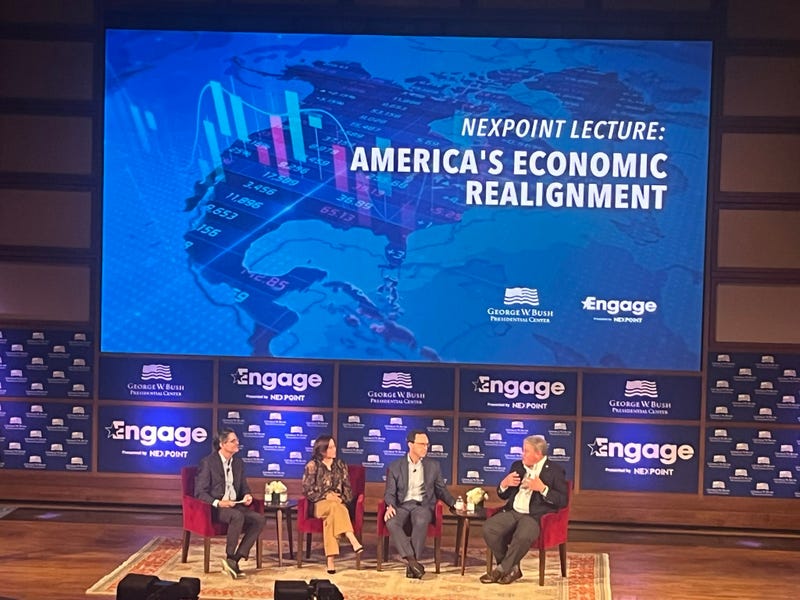
A panel at the George W. Bush Presidential Center talked about how the country's economy is changing and could be affected by issues like immigration and tariffs. "Engage at the Bush Center" is sponsored by NexPoint, and this week's event included several economists.
This week's event included the potential impact of tariffs and changes to immigration policy.
"We've seen really significant shifts in our economic policy since January 2025, since the new administration took office," says Cullum Clark, director of the Bush Institute-SMU Economic Growth Initiative. "Some of the areas, of course, include the relationship between government and private business; tariffs and trade; policies to accelerate how we build things in America like factories, roads and bridges, and homes; the Federal Reserve and monetary policy; AI and other innovative, new technologies."
Clark says many of those changes had started before the current Trump Administration, but basic questions about how the economic system should work and how America can promote economic policy are now "up for grabs."
"In the Biden years, we saw a real resurgence in industrial policies, subsidies to semiconductor companies and so forth," he says. "Now, in the past year, we've seen something totally different, the government taking an equity interest in Intel and other companies."
Kristen Silverberg, Business Roundtable President and Chief Operating Officer, says the government has previously acted as a "referee," laying out regulations and protecting competition. She says the Biden Administration took a step toward more activism, and the Trump Administration has "taken a further step in that direction" by negotiating equity stakes and profit sharing with companies that may have national security interests.
She says companies that produce semi-conductors and need rare-earth minerals have drawn interest to reduce a perceived reliance on China.
"It's not entirely unprecedented for the U.S government to take an equity stake in a company. It happened after the financial crisis, but it normally is something that's in response to a crisis, and the government is trying to get out of its position as quickly as possible," Silverberg says. "It is unusual for the government to take a long-term position."
Keith Hennessey, a former director of the National Economic Council and current George W. Bush Institute David Rubenstein Fellow, says supply chains controlled by China are vulnerable.
"Most people immediately go to a national security vulnerability, but there are also economic vulnerabilities," he says. "All the auto manufacturing in the United States could have supply chains controllable by the (Chinese Communist Party), and that could be a serious vulnerability for us. That could then be used to justify, in some cases, interfering in a normal referee function."
Hennessey says a drawback would come from other companies that see "government largesse" and start trying to make a case they are also a national security interest deserving public investment.
On tariffs and immigration, panelists said the Trump Administration was trying to use a mix of policies to increase re-shoring jobs and increasing salaries. Marc Sumerlin, former Deputy Director of the National Economic Council, says tariffs amount to a $300 billion tax on the economy.
"The economy's done exactly what you'd expect. It's slowed down," he says. "So far, what we're seeing is slowing job growth. The part that is particularly misguided is if you really want to have businesses come here, you have to lower the cost of production."
Sumerlin says current tariffs are on basic materials but should instead be placed on finished products.
"The Trump Administration is tariffing basic materials like copper, steel and lumber. They're also tariffing parts, making it much more expensive to do business here," he says. "There's been no increase in investment so far because they're actually doing a lot of things that are counterintuitive. If you wanted to do tariffs for the revenue, do it on the finished product coming in, the Lexus coming in. Don't do it on the parts GM needs to make a car in the U.S., and don't make it on the lumber we need to make houses when we're in the middle of a housing crisis."
Sumerlin says tariffs currently apply to materials not readily available in the United States like copper from Chile.
Panelists also say the United States must prepare for the energy needs of data centers and artificial intelligence. The Business Roundtable's Silverberg says technology will require more energy, but if onshoring of jobs continues, the U.S. will need to plan for increased need from manufacturers as well.
"We're going to need all forms of energy," Silverberg says. "Our energy demands are going to spike. The only way we're going to realistically tackle that is if we lean into oil, gas, nuclear, hydrogen, wind, solar, all of it, which is something Texas does quite effectively."
Silverberg says business groups will work with Congress to plan ahead.
While creating enough power to satisfy the demands of artificial intelligence, Hennessey, the former director of the National Economic Council, says companies are only experimenting with the technology. He says it is too soon to determine AI's potential impact on the workforce.
"AI is a sexy term. It conjures all the Terminator movies, the fun, imaginary robot future-type images," he says. "Large language models are not actually intelligent. They don't know, there's no sense of understanding of what it's saying. It is Google Autocomplete on steroids."
To keep ahead of China and other countries, panelists said the United States needs to plan ahead, describing uncertainty in policy as an economic burden.
